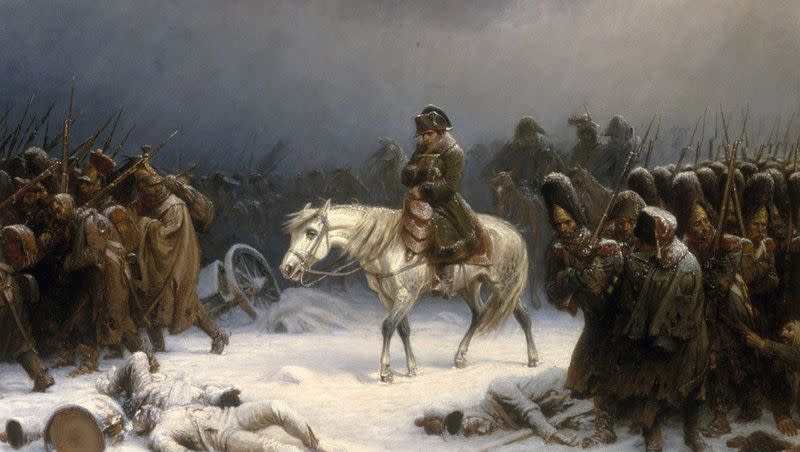‘Napoleon’ biopic releases official trailer. What’s the story of Napoleon?

- Oops!Something went wrong.Please try again later.
- Oops!Something went wrong.Please try again later.
- Oops!Something went wrong.Please try again later.
Known for playing Arthur Fleck/Joker in the box office smash “The Joker,” Joaquin Phoenix is starring as Napoleon Bonaparte in the soon to be released film “Napoleon.”
It’ll be released in theaters on Nov. 22, according to The Hollywood Reporter. Directed by Ridley Scott, the film also stars Ben Miles, Matthew Needham, Rupert Everett and others.
The first official trailer was released on Monday by Sony Picture Entertainment. It opens with battle sequences and scenes showing the chaos of the French Revolution. “I’m the first to admit when I make a mistake,” Napoleon said in the trailer. “I simply never do.” Napoleon’s rise to power and plans to conquer the world are shown in the film alongside scenes of his relationship with Josephine (Vanessa Kirby).
It’s rated-R for strong violence, some grisly images, sexual content and brief language. After the film has its theatrical release, it’ll stream on AppleTV+, per Deadline.
Scott said to The Hollywood Reporter, “No actor could ever embody Napoleon like Joaquin. He created one of movie history’s most complex Emperors in ‘Gladiator,’ and we’ll create another with his Napoleon.”
Scott and Phoneix previously worked together on the movie “Gladiator.” Phoenix played the emperor Commodus.
What’s the story of Napoleon Bonaparate?
Born on Aug. 15, 1769, Napoleon’s birthplace, the island of Corsica, had just been conquered by France. “I was born when (Corscia) was perishing. ... The cries of the dying, the groans of the oppressed and tears of despair surrounded my cradle from the hour of my birth,” he said, according to PBS.
He grew up in Corscia and moved to mainland France when he was 9 years old, per Napoleon Foundation. There he attended school starting on May 15, 1779. A few years later on Sept. 22, 1784, Napoleon was admitted into the École Militaire — a school for training future French military officials.
Napoleon rose through the ranks in school and was serving in the French army right during the onset of the French Revolution, per Napoleon Foundation. The exact causes of the French Revolution are debated, but some of them have to do with the lower classes no longer wanting to support the feudal system, crop failures, the French government’s bankruptcy and the bourgeoisie’s frustration with being excluded from political power, per Britannica.
The French Revolution was key to Napoleon’s rise.
When the French Revolution started, he was a second lieutenant in the French army. Over time, Napoleon developed relationships with the Jacobins, who were a pro-democracy group led by figures like Maximilien Robespierre, according to history.com. During this time, different people and groups came in and out of power.
Napoleon kept increasing his power. “In 1795, Napoleon helped suppress a royalist insurrection against the revolutionary government in Paris and was promoted to major general,” according to history.com.
Although Napoleon had left France to fight internationally, he returned in 1799 and participated in a coup which overturned the French government, effectively ending the French Revolution. Then, Napoleon became the first consul of France, per history.com. He developed the Napoleonic Code — the foundation of the French legal system — and reformed French institutions. In 1802, he became first consul for life and two years later, he crowned himself emperor at the Notre Dame Cathedral.
His rise to power sounds a lot like Julius Caesar’s. Caesar became a well-known military leader in ancient Rome during a period of civil wars, too. Eventually, he took his army back to Rome and overthrew the government. This comparison was made to Napoleon during his life, according to historian John Abbott. A colleague of Napoleon told him, “Oh Napoleon! There is nothing modern in your character. You are formed entirely on Plutarch’s model.”
When Napoleon would later be exiled, he’d spend part of his time dictating a commentary on what Caesar wrote thousands of years prior when he was at war.
Napoleon’s pursuit of military power didn’t cease upon his becoming emperor. Throughout Europe, he conquered several areas like Venice and Dalmatia for Italy and also conquered German states for France. His relentless military campaigns were eventually met in 1813 with the Sixth Coalition against France, per University of Pennsylvania. His army was defeated — one of his rare defeats.
Napoleon had to return to Paris after being defeated and a year later, Paris fell, according to University of Pennsylvania. He was driven into exile in 1814, briefly returned to France in 1815 and then, spent the rest of his life exiled on St. Helena.

